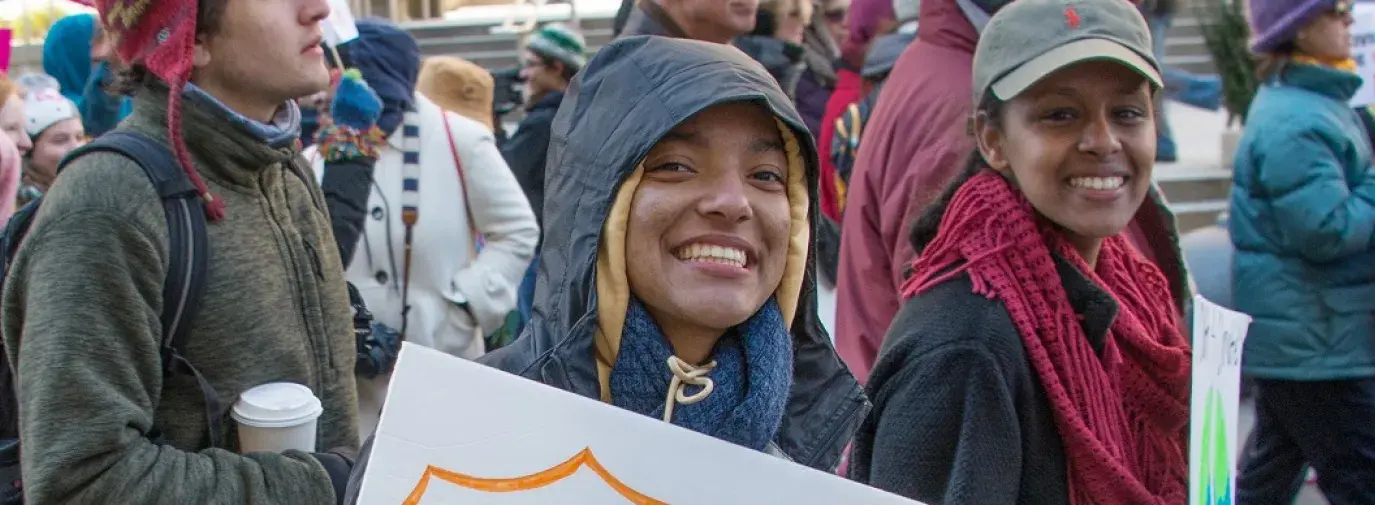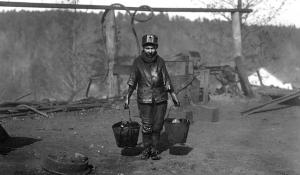
By the time you read this, Americans will be only a few months away from electing their next president and the global community will have witnessed an unprecedented year. From a volatile and narrowly diffused nuclear conflict with Iran, to rampant fires in Australia, 2020 has delivered headline after headline that would be considered sensational if they weren’t true.
But the most globally important story to date is the novel coronavirus, which escalated into a historic global pandemic. Like the 2020 presidential election, the coronavirus pandemic is an unfolding story destined to shape our immediate future and for us at Green America, it’s safe to say that it has only heightened our sense of urgency.
While Green America focuses primarily on voting with our dollars, we know we need all Americans to vote in the electoral process too, and at every opportunity so that we can elect the courageous leadership we need in our national and local government. That’s why we talked to organizations involved in voter advocacy to find out how they’re getting people pumped for November third.
A YES Vote for the Climate
Since announcing his intention to withdraw from the Paris Agreement as one of his first acts in office, President
Trump has rolled back over 100 environmental laws including the landmark 1970 National Environmental Policy Act (NEPA) which reviews corporations’ environmental impacts, including projected greenhouse gas emissions. On March 26, amid the pandemic, the Environmental Protection Agency (EPA) also suspended penalties against pollution violators, effectively giving companies the green light to pollute as much as they want.
These decisions spell disaster not only for the planet’s lands, seas, and atmosphere, but for humanity itself. Although 97 percent of climate scientists agree that human activities are fueling the climate crisis, the US still lacks aggressive, emission-reducing policies that would force corporations to stop doing business as usual.
Deregulations are likely to increase the disproportionate exposure of lower-income communities and people of color to air pollution as they are twice as likely as white Americans to live near an industrial facility, according to a 2015 report by
the Center for Effective Government.
“Doing something about climate change and environmental injustice really depends on following the science and listening to experts in the field and the administration’s engagement with the public about the impact of rollbacks like NEPA is almost nonexistent,” says Mark Antoniewicz, director of communication at Hip Hop Caucus.
Studies from the Pew Research Center show that in 2016, broad dislike for both candidates was a major contributing factor to low voter turn-out among registered voters. At the same time, Pew’s data shows that as of July 2019, millennials became the most populous generation group, meaning people ages 23-38 could flex significant political power in 2020.
But how do we engage groups with historically significant voting power but aren’t always prioritized during critical times of campaign outreach?
Powered by Music: Hip Hop Caucus’s Voting Movement
Hip Hop Caucus has a history of organizing and empowering people to vote. In 2004, the organization’s co-founder Rev. Lennox Yearwood partnered with music industry magnate Sean Combs’s “Vote or Die” campaign and in 2008, Hip Hop Caucus’s own “Respect My Vote” campaign broke a world record by registering 30,000 voters in a single day. In another crucial election year, Hip Hop Caucus has revived this campaign and it’s replete with luminaries in hip hop music.
“There was a time when hip hop music was perceived by some as being too ‘out there’ and not serious enough but now those tables have turned,” says Antoniewicz. “Now hip hop is everywhere and people are eager to utilize it, from congressional members to different presidents.”
Entertainers like radio personality Charlamagne tha God [sic], actress Keke Palmer, and rapper Vic Mensa have signed on to be 2020 “Respect My Vote” spokespeople.
Visitors to RespectMyVote.org can register to vote and find voting information for their state including what types of identification voters will need at the booth and guidelines for previously incarcerated people.
These efforts targeted to Black and Brown communities are essential to getting Washington to meaningfully address the issues that disproportionately affect these groups, such as environmental injustice and unfair labor. In many ways, COVID-19, like climate change, has exposed the ways a global, existential threat intensifies disparities that already exist. In April 2020, alarming reports emerged about the rates of COVID-19 deaths in Black communities. For instance, in Chicago, African Americans make up 30 percent of the population, but 70 percent of all COVID-19 deaths; in Milwaukee, Wisconsin, a notoriously segregated city, African Americans account for 27 percent of the population, but approximately 50 percent of COVID-19 deaths, according to data from Milwaukee county.
In April, Wisconsin’s primary election proved the availability of mail-in ballots as a voter suppression issue. In spite of Milwaukee being Wisconsin’s largest city and having over 1,500 reported coronavirus cases, according to The Guardian, it closed most of its polling places due to a lack of available workers, which left only five precincts open. Voting day resulted in masses of people turning out to vote in cramped conditions that may have further spread the virus.
Fair Fight, led by Georgia politician Stacey Abrams, is one of the organizations calling out these covert forms of voter suppression. Fair Fight, the American Civil Liberties Union, and the Brennan Center for Justice are leading campaigns to reform practices that disproportionately disenfranchise people of color from the process like discriminatory identification standards to early and absentee voting.
Kids Step Up
Today, some of the most influential activists are still in school and some aren’t even to voting age yet. Jamie Margolin is the 18-year-old co-founder of Zero Hour, a nonprofit with a mission to center diverse voices of youth in the climate change and justice conversations. Jonah Gottlieb is the 17-year-old co-founder of the National Children’s campaign, a non-partisan organization focused on making children a priority in political agendas and engaging youth in the civic process. Together, they’re leading “#Vote4OurFuture,” a campaign focused on increasing voter turn-out among first-time voters and empowering climate- and environmental justice-oriented voters.
Zero Hour will kick off the campaign by asking followers to share videos about why they’re excited to vote in 2020 using #Vote4OurFuture. It intended to go on a bus tour to cities experiencing widespread environmental injustices like Philadelphia, Milwaukee, and Flint to help local organizers register people to vote.
“These cities were chosen because we want to reach communities that national organizations often don’t go to but also because these are communities are already doing great work,” says Margolin. “We’re there to help bring national attention, not to be saviors.”
The tour was postponed because of the COVID-19 pandemic.
At the National Children’s campaign, Jonah Gottlieb says he’s looking forward to helping people realize their political power.
“One of the things that I think sets our organization apart is that we give trainings on how to write legislation, work with members of Congress to edit it, and bring it to the floors of the House and the Senate,” says Gottlieb. “We want to show people that you don’t need a lobbyist to impact your government.” Antoniewicz, Margolin, and Gottlieb say their organizations are working to communicate the power of the whole civic process, not just the presidential election.
“It’s exciting to be coming of age politically and when we’ve seen such a resurgence in youth activism. I don’t really know any other ‘political normal’ because I was in eighth grade when Donald Trump started running for president,” says Gottlieb. “For me and many others in this movement, we understand that we need massive mobilization at every level against these forces that are fighting against our right to have a livable future and planet.”







